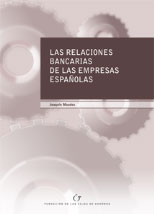A report published by Funcas analyzes the banking relationships of Spanish firms
The study, carried out by the Ivie, shows which firms the banks are more oriented towards, as well as the effects of the crisis on their banking relationships
Did the credit institutions that were bailed out and nationalized work with more risky and less profitable firms? Were they more oriented towards firms in the construction and real estate sectors? Did their clients have greater debt burdens?
These are some of the issues discussed in the study Las relaciones bancarias de las empresas españolas, published by Funcas and developed by the Ivie from a sample of 235,000 firms.
 The results of the study indicate that the financial situation of credit institutions has a direct relationship with the type of firms they worked with during this past decade. Thus, at the beginning of the crisis in 2007, the credit institutions which have been intervened and nationalized worked more with firms related to the real estate and construction sectors than the rest of the credit entities. They also were more oriented towards less profitable, more indebted and risky firms with higher debt burdens.
The results of the study indicate that the financial situation of credit institutions has a direct relationship with the type of firms they worked with during this past decade. Thus, at the beginning of the crisis in 2007, the credit institutions which have been intervened and nationalized worked more with firms related to the real estate and construction sectors than the rest of the credit entities. They also were more oriented towards less profitable, more indebted and risky firms with higher debt burdens.
On the contrary, entities with no need for capital injection and those that have attained the necessary capital without public aid have fewer relationships with firms in the real estate sector and more with companies with higher profitability and fewer risk, debt and burden of debt. In addition, strong financial institutions are more oriented towards service and, especially, industrial sectors.
The report, directed by the Ivie researcher and Professor of the University of Valencia Joaquin Maudos, offers for the first time an analysis of the firms’ characteristics in relation to the type of financial institution they work with (domestic banks, foreign banks, savings banks or credit unions). This allows to analyze how deposit entities in Spain have changed their orientation towards a certain type of firm, and also shows the impact of the crisis on the banking relationships of Spanish firms.
Some results of the study are:
- Credit institutions that have been nationalized and bailed out worked at the beginning of the crisis with less profitable and high indebted firms, and were more oriented towards real estate and construction firms.
- Firms that work with credit institutions that have been nationalized and intervened are 27.5 less profitable than firms that work with credit entities that have not needed capital aid to cope with an adverse scenario in the stress tests.
- Spanish firms operate on average with 1.85 financial institutions, for an average period of 4.6 years.






